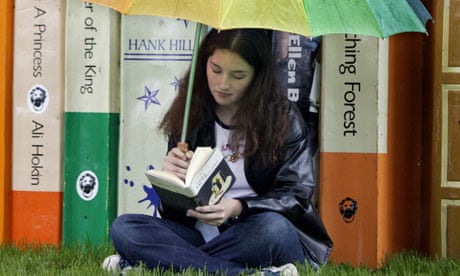Moving from primary to secondary school, I remember being encouraged to soak up as much canonical children's fantasy (Susan Cooper, Alan Garner, Penelope Lively) as I liked, and to make the salmon-leap to grownup books by reading classic titles – Jane Eyre, Pride and Prejudice, a bit of Steinbeck, a bit of Golding. While I was delighted to find fantasy topping the menu, and didn't object to taking on more challenging adult fiction, I also remember an unvoiced but distinct disapproval – a strong hint of arched eyebrow and indrawn breath – if you were caught reading Judy Blume or Paula Danziger. There was a sense of: "It's all very well, but it's teen fiction." There was even a hint of, "You've taken the easy option there, haven't you?"
At 11, it didn't occur to me to take issue with my teachers' characterisation of Blume and Danziger as "easy reading"; literary muzak. (I was a pusillanimous child.) The echoes of mild pedagogical sarcasm continued to ring faintly in my ears for years to come, with the result that when I recently went on a library-fuelled Judy and Paula binge, I felt like a guilty homework-dodger. But rereading The Cat Ate My Gymsuit, I suddenly felt a rush of long-overdue indignation on the book's behalf.
Danziger's prose may not be Nabokovian – although it's certainly welcoming to the reader – but the subject matter is anything but facile. Marcy, the overweight, painfully shy, very clever heroine of Gymsuit, has a stinker of a dad to deal with – a patriarchal oppressor of the old school – as well as compulsory PE, which forces her to come up with a series of excuses to avoid baring all to her classmates (hence the title). Her hot-faced agony at the prospect of revealing herself in body or soul transported me instantly back to the miseries of early adolescence, when I was never going to be thin enough or have the right jeans; when I imagined I'd live in a limbo of never belonging, sans boyfriend or courage to leave the house, for the rest of my life. Judy Blume's Are You There, God? It's Me, Margaret similarly distils the impatience felt by just-pubescent girls waiting for the physical markers of adulthood – menstruation and breasts – to show up. This is not junk fiction.
Possibly because I'd subconsciously acquired a sense that books for teens were infra dig, I held out against Jacqueline Wilson, sometimes called the UK's Judy Blume, until last week. (It might also have had something to do with the incredibly garish covers. If only publishers wouldn't assume that all girls love pink: the odd boy might pick one up if they looked less candy-coated.) Realising, after my nostalgic orgy, that I'd succumbed to a silly, snobbish prejudice, I began to set matters straight. Three books later, I'm convulsed with envy for the lucky lasses allowed – nay, encouraged – to read Wilson's work.
Her subject matter, again, tends to be challenging with a capital C – my lucky dip revealed a burgeoning relationship between girl (14) and married male art teacher, a dysfunctional, masochistic mum with a taste for liquor, and a good dose of homophobia and heartbreak. I actually had to put Lola Rose down several times when it became too distressing, and think merry thoughts of brownies and pixie rings before returning to it. But I found the books completely compelling. Like Gymsuit and Are You There, God, they fling wide the windows into the dark, smelly bedroom of adolescence, revealing to cowering little aliens everywhere that They Are Not Alone.
I wonder how many children are put off reading altogether because the canonical and the "worthwhile" are trumpeted as the only books worth the time it takes to read them. As the recent (non-exhaustive) G2 list of the best children's books ever suggests, reading should, by all means, be educational and challenging, but it should be pleasurable too. If I have a daughter – or a brave and unconventional son – Wilson's books will be made welcome on our shelves. Although, I draw the line at queuing for eight hours for an autograph.

Comments (…)
Sign in or create your Guardian account to join the discussion